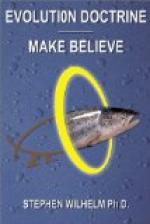To the zooelogist it seems strange that so many are opposed to a scientific inquiry into the facts of human evolution, and to the conclusions established by such an inquiry,—though, to be sure, this opposition is directly proportional to ignorance or misunderstanding of the nature and purpose of scientific investigation and of human evolution. The naturalist comes to view our species as a kind of animal, and as a single one of the hundreds of thousands of known forms of life; thus the question of human origin is but a small part of organic evolution, which is itself only an episode in the great sweep of cosmic evolution, endless in past time and in the future. Were we some other order of beings, and not men, human evolution would appear to us in its proper scientific proportions, namely, as a minute fraction of the whole progress of the world.
While the foregoing statements are true, it is nevertheless right that a close study should be made of the particular case of mankind. No doubt much of the naturalist’s interest in nature at large is due to his conviction that the laws revealed by the organisms of a lower sphere must hold true for man, and may explain many things that cannot be so clearly discerned when only the highest type is the subject of investigation. It is only too evident that little more than a general outline can be given of the wide subject or group of subjects included under the head of human evolution. We must divide the subject logically into parts, so that each one may be taken up without being complicated by questions relating to topics of another category, although the findings in any one department must surely be of importance for comparison with the results established in another section; for if evolution is universally true, the main conclusion in any case must assist the investigation of another, just as comparative anatomy and embryology supplement and corroborate each other in the larger survey of organic evolution. As before, the illustrations of each department of the subject must be selected from the stock of everyday observation and information that we already possess, for we gain much when we realize that evolution includes all the happenings of everyday life and thought, as well as the occurrences of the remote past.
For the present, then, the questions relating to the higher aspects of human life must be put aside, only that they may be taken up at the last. Social evolution likewise finds its place in a later section, after the phenomena of mind and mental evolution receive due attention and description. At the present juncture, the human species presents itself as a subject for organic analysis and classification, merely as a physical organism. Just as the study of locomotives must begin with the detailed structure of machines in the workshop before they can be profitably understood as working mechanisms, so the physical evolution of mankind must first be made intelligible before it is possible to prosecute successfully the studies dealing with the psychology, social relations, and higher conceptions that seem at first to be the exclusive properties of our species.




